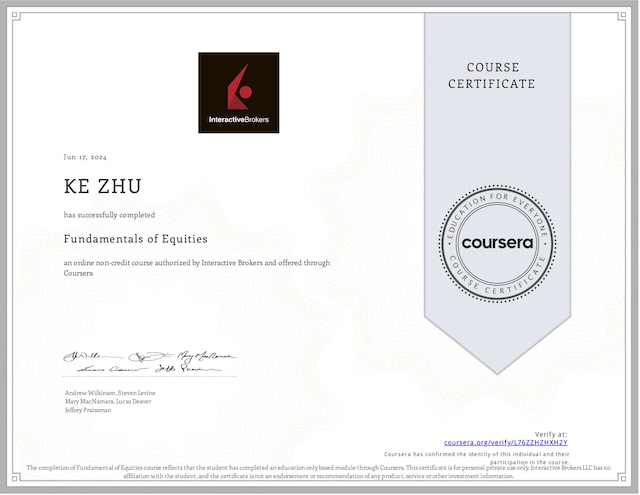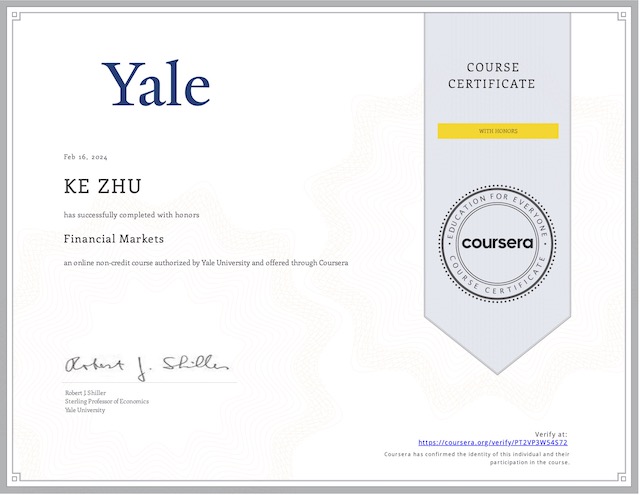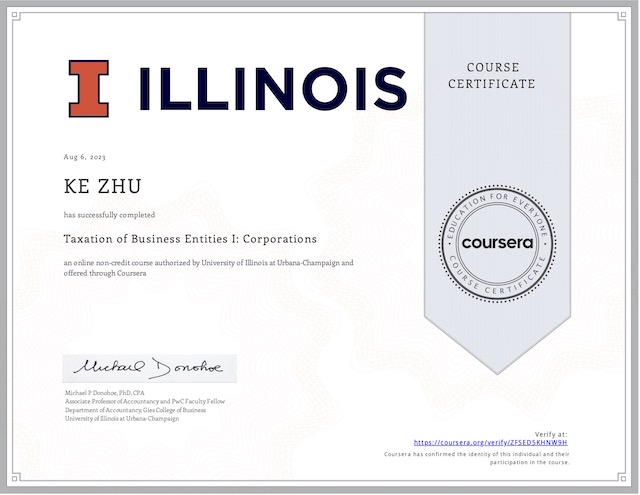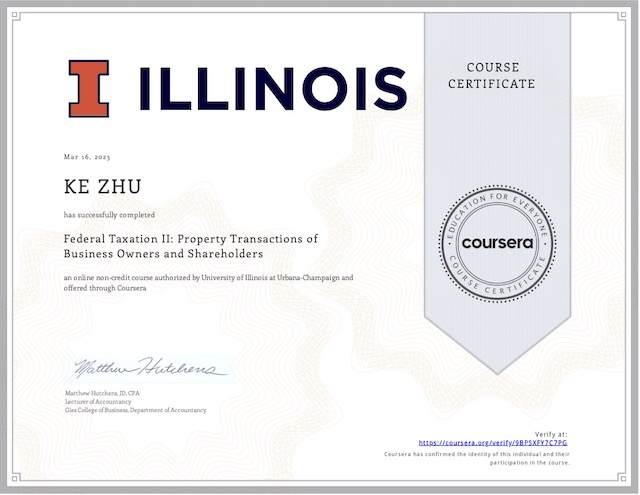Fundamentals of Equities Interactive Brokers This is a nice course introducing all fundamental concepts you need to know as a newcomer. You will familiarize yourself with some common terms and concepts surrounding investments. You will understand how important are the accounting concepts like the income statement, balance sheet and statement of cash flows. My Certificate…
Category: Finance
My 156th certificate from Coursera
Derivatives – Options & Futures Interactive Brokers This is a short overview of derivatives: options and futures. You will learn basics and how to trade on Interactive Brokers online platform. However bear in mind that derivatives involve critical risk so that are not suitable for all investors. Learning a few courses won’t guarantee that you…
My 143rd certificate (with Honors) from Coursera
Financial Markets Yale This is a wonderful course taught by Professor Robert Shiller, who was awarded the 2013 Nobel Prize for Economics. This is an entry-level course, but very informative. It deserves your attention and time, even you are not a finance professional. Besides the lectures recorded in auditorium, there are also lots of videos…
My 139th certificate from Coursera
Taxation of Business Entities I: Corporations University of Illinois at Urbana-Champaign Taxation is a very interesting perspective to observe and understand how business entities work. This course provides an introduction to the U.S. federal income taxation of corporations and their shareholders. The course is designed to cover entire lifecycle of a C corporation, from its…
Basics of Corporate Reorganization
The term reorganization is often associated with financial difficulty, such as the reorganization of debts under state or federal bankruptcy laws. For taxes purposes, however, the term refers to any corporate restructuring or rearrangement, which can, but does not necessarily occur at the end of the corporate life cycle. The US tax system aims to encourage growth….
Tax Treatment for Corporate Liquidations
Partial liquidations takes place when there is a contraction or reduction of a corporation’s business activities. Complete liquidations occur at the end of a corporation’s life cycle. Surprisingly, the IRS Code does not define what complete liquidation is. Instead, Treasury regulations indicate that a complete liquidation exists for tax purposes. … when the corporation ceases to be a…
Corporate Stock Redemption
A stock redemption occurs when a shareholder sells stock back to the issuing corporation for cash or property. A redemption raises many important and potentially complex tax issues. If the shareholder who redeem stocks is the only shareholder, a stock redemption has no effect on his proportionate ownership interest in the corporation. In this case, if this redemption…
Corporate Non-Liquidating Distribution
As corporations operate, they can share their economic successes with shareholders by making distributions. However distributions are not necessarily required and different firms have different incentives and disincentives. From a tax perspective, it is necessary to classify distribution as: The term non-liquidating distribution implies that the distributions are not in an effort to wind up the affairs of the…
Taxation for Corporation Formation: Liabilities, Capital and Loss
Along with assets, corporate formation also routinely involves the transfer and assumption of liabilities. The corporation is taking responsibilities for such liabilities, but an important tax issue arises. Does the assumption of liabilities by the corporation (transferee) constitute boot received by the shareholder (transferer)? Assumption of Liabilities Recall that in addition to the stock of corporation, shareholders can also…
Taxation: Non-Recognition Rules for Corporate Formation
Important tax issues arise throughout the corporate lifecycle: its formation, operation and liquidation. The formation of a corporation generally involves the transfer of assets and liabilities by one or more persons in exchange for stock in the newly formed corporation. Property Transaction IRC subchapter O: Gain or Loss on Disposition of Property defines the rules for property…
Corporate Income Taxation
Regular Income Tax Liability The regular tax liability calculation itself is very straightforward: The complexity of corporate income tax thus stems from the rules and regulations that shape and define the tax base, i.e. corporate taxable income. For tax years beginning after 2017, the Tax Cuts and Jobs Act reduced the corporate tax rate to…
Essential Concepts of Business Taxation
Origin of Federal Taxation The first income tax in the US was enacted in 1634 by the Massachusetts Bay Colony. The federal government however did not initially adopt this form of taxation; in part because it did not have the authority to do so. It was not until 1787 that Article 1 Section 8 Clause…
My 128th certificate from Coursera
Federal Taxation II: Property Transactions of Business Owners and Shareholders University of Illinois at Urbana-Champaign As individual or a business owner, have you ever googled questions like “Why are taxes so complicated?” There are quite many articles explaining the reason why. From the internet, I found this answer quite impressive: Our tax system could be…
Character of Gains and Losses, and The Netting Process
Recall there are a few key items when evaluating a property transaction: Also recall the holding period of a property technically begins on the day after the property is acquired and includes the day of properties disposition. Short-term holding period is where an asset is held for one year or less. Long-term holding period is…
Federal Taxation: Special Gain and Loss Provisions
In the last post, we looked at two major non-taxable exchanges: like-kind exchanges and involuntary conversions. In those transactions, any realized gain or loss is generally not recognized at the time of the transaction. Instead, realized gain or loss is deferred until some future point, usually when newly acquired property is ultimately disposed off. This…














